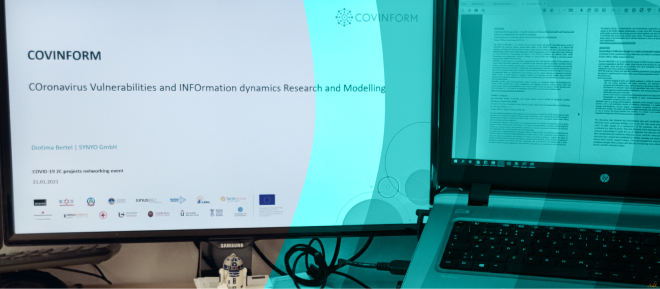
01 Feb COVINFORM at the COVID-19 2C sister project meeting
On 22 January 2021, COVINFORM partners attended a meeting for projects funded under the European Commission (EC) call for innovative solutions to tackle the ongoing COVID-19 pandemic, in particular, those addressing behavioural, social and economic impacts of the outbreak response. The call was a part of EC actions against the pandemic: since the beginning of the crisis in March 2020, the EC coordinated a rapid response between member countries. In addition to funding calls, the EC’s response involved support for companies in the field of vaccine development and coronavirus innovation, as well as coordinating clinical trials. It promoted sharing and exchange of research data between the members for an efficient response – facilitated by Open Science and European Research Area (ERA) Corona platforms.
During the meeting, measures undertaken by the EC to tackle the coronavirus crisis were presented, after which each project had a chance to outline the scope of their research. COVINFORM presented the project’s aims and activities, alongside the four other projects funded under the same call: PERISCOPE, RESPOND, SHARE-COVID and RESISTIRE. Since all projects are a part of the same cohort focusing on behavioural, social and economic impacts of the outbreak response – the meeting was intended to provide a platform to discuss the shared focus, preliminary research and future results.
The projects funded under the same call are highly complementary, which will allow them to build space for exchanging ideas, for example, on data standardization and cooperation, yet to be achieved at the European level in some areas such as health. Cooperation will additionally enable them to collaborate on policy recommendations to ensure maximum impact. The diversity of sources used by the partners will allow achieving a higher level of data granularity – cooperation can enhance insights from respective projects, where, for example, economic data might be complemented by mobility or social data. The exchange between the projects will also allow to share and combine research on vulnerable groups, vulnerability, resilience and risk. In the future, further meetings will be organised to share preliminary results between the projects. This will lead to more robust outcomes and will allow for early detection of possible differences in similar areas of research.
About the projects
PERISCOPE addresses the indirect effects of the pandemic – and sustainable policies to address them. It employs interdisciplinary research ranging and uses tools from existing COVID-19 platforms to create a data atlas, which provides a holistic model followed by statistical learning to come up with potential best practices – then to be implemented in the guidelines.
RESPOND analyses the psycho-social response to the pandemic and the impact of the pandemic on mental health and the vulnerable, amongst other measures it will compare mental health data between countries with various levels of restrictive measures (Sweden/Lombardy/Catalonia).
SHARE-COVID investigates the non-intended effects of the epidemiological control measures. It will identify the effect of lockdown on both health and health behaviours, as well as labour market implications.
RESISTIRE focuses on intersectional and gender-oriented analysis of the pandemic effects. The project investigates for whom and for what type of inequalities there were positive and negative effects by combining mapping policies, quantitative indicators and collective narratives of people who experienced the impact in terms of inequalities.
COVINFORM analyses COVID-19 responses on the level of government, public health, community, and information and communication with a focus on the impacts on vulnerable individuals and groups.
Author: Melania Parzonka, Trilaterial Research
